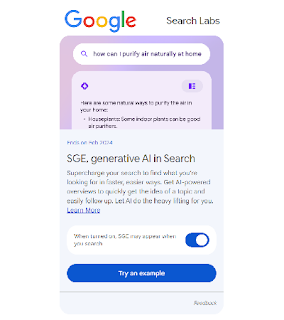AI and Customer Experience: How AI is Revolutionizing the Way Businesses Interact with Customers
Discover the latest innovations in customer experience and how AI is transforming the way businesses interact with their customers.
In this blog post, we explore how AI is revolutionizing customer experience. We discuss how AI is used in customer service, personalization, and insights, as well as the challenges that come with this technology. We also discuss the future of AI in customer experience and how it can improve the way businesses interact with their customers.
Artificial Intelligence (AI) has been making headlines in recent years, transforming a wide range of
industries. One of the most notable areas where AI is making a significant
impact is customer experience. Businesses are increasingly turning to AI to enhance
their customer service, streamline processes, and personalize interactions. In
this article, we will explore how AI is revolutionizing customer experience and
what it means for businesses and customers alike.
AI and Customer Service
AI is transforming the
way businesses interact with customers through the use of chatbots, virtual
assistants, and automated responses. Chatbots, in particular, have become
increasingly popular in recent years, providing businesses with an efficient
and cost-effective way to handle customer queries and complaints.
One way that AI is
transforming customer service is through chatbots. Chatbots are essentially
computer programs that can simulate human conversation. They use natural language processing (NLP) and machine learning algorithms to understand and
respond to customer queries. This means that businesses can provide 24/7
customer service without the need for human intervention. They are becoming increasingly popular in customer
service as they can handle a large volume of customer queries simultaneously
and offer quick and accurate solutions. Chatbots can provide round-the-clock
support, and they can save companies a lot of money by reducing the need for human
agents.
Moreover, AI-powered
chatbots are becoming increasingly sophisticated, allowing businesses to
personalize their interactions with customers. Chatbots can analyze customer
data and provide personalized recommendations and solutions. They can also
learn from customer interactions and improve their responses over time,
providing a more seamless and personalized customer experience.
AI algorithms can analyze
customer data and purchase history to suggest products or services that are
most relevant to them. This not only improves the customer experience but also
increases the likelihood of repeat purchases and customer loyalty.
Another way AI is
revolutionizing customer service is by enabling companies to proactively
identify and address customer issues before they become bigger problems. AI
algorithms can analyze customer behavior and sentiment to predict potential
issues and enable companies to take necessary action in advance.
AI is transforming the
customer service industry by providing faster, more personalized, and proactive
support to customers. While AI cannot replace human interaction entirely, it
can assist companies in providing better customer service and ultimately lead
to greater customer satisfaction and loyalty.
AI and Personalization
AI and personalization
have become increasingly intertwined in recent years, with AI technology
allowing companies to provide more customized experiences to their customers.
By collecting data on customer preferences, behaviors, and interactions with a
brand, AI can help companies tailor their products, services, and marketing
efforts to better meet the individual needs of each customer.
One area where AI is
making a big impact on personalization is in e-commerce. Online retailers are
using AI algorithms to analyze customer browsing and purchase histories to make
personalized product recommendations. This not only helps customers find
products that they are more likely to purchase, but it also increases the
chances of customer loyalty and repeat business.
Another way that AI is
improving personalization is through chatbots and virtual assistants. These
intelligent tools can be programmed to recognize customers and remember their
previous interactions, providing a more seamless and personalized experience. For
example, a virtual assistant can greet a customer by name and suggest products
based on their previous purchases.
AI-powered
personalization is also being used in the entertainment industry. Streaming
services like Netflix and Spotify use AI algorithms to analyze customer viewing
and listening habits, creating customized playlists and recommending content
that is more likely to interest each individual user.
However, there are some
concerns around AI and personalization, particularly around privacy and data
security. Customers may be hesitant to share personal information with
companies, and there is always the risk of data breaches and hacks. Companies
must be transparent about their data collection and usage practices and take
steps to protect customer data.
Overall, AI is allowing
companies to provide more personalized experiences to their customers,
improving satisfaction and increasing the likelihood of repeat business. As AI
technology continues to advance, we can expect even more sophisticated and
personalized experiences in the future.
Moreover, AI can also be
used to personalize marketing campaigns. AI-powered algorithms can analyze
customer data to identify trends and patterns, allowing businesses to create
more targeted and effective marketing campaigns.
AI and Customer Insights
AI is changing the game
when it comes to understanding customer insights. With its ability to analyze
large amounts of data, AI can help businesses gain a deeper understanding of
their customers' behaviors, preferences, and needs.
By leveraging AI-powered
analytics tools, businesses can collect and process vast amounts of data from
multiple sources, such as social media, customer feedback, and purchasing
history. This data can then be used to identify patterns and trends that can
help businesses make more informed decisions about their products, services,
and marketing strategies.
For example, AI-powered
analytics can help businesses identify which products or services are most
popular among their customers, what their customers are saying about their
brand on social media, and which marketing channels are driving the most sales.
Armed with this information, businesses can make data-driven decisions that can
help them improve customer satisfaction, increase sales, and build stronger
customer relationships.
Furthermore, AI can also
help businesses predict customer behavior and anticipate their needs. For
instance, AI can use data to identify when a customer is likely to make a
purchase or when they may be in need of additional support. This can enable businesses
to provide personalized recommendations, offers, or support at the right time
and through the right channels.
Overall, AI-powered
customer insights can help businesses gain a competitive edge by providing them
with a deeper understanding of their customers' needs and behaviors. By using
this information to improve their products, services, and marketing strategies,
businesses can build stronger relationships with their customers and ultimately
drive business growth.
AI and Customer Experience Challenges
While AI is transforming
customer experience, it is not without its challenges when it comes to
improving customer experience. One of the biggest challenges is ensuring that
the AI system is properly trained to understand and respond to customer needs.
This requires a large amount of quality data and the right algorithms to
extract insights from that data.
Another challenge is
maintaining a balance between automation and human interaction. While AI can
handle many routine tasks and interactions, customers may still crave a human
touch for more complex issues. Finding the right balance between the two is key
to a successful AI-powered customer experience.
Another potential challenge
is privacy concerns. As AI systems gather more and more data about customers,
there is a risk of that data being misused or mishandled. It is important for
companies to prioritize data privacy and security to maintain customer trust.
Finally, there is the
risk of over-reliance on AI. While AI can help improve customer experience in
many ways, it is important not to forget the importance of human empathy and
emotional intelligence in creating positive customer interactions. Companies
need to be aware of the limitations of AI and use it in conjunction with human
expertise and judgment.
Overall, while there are
challenges associated with AI and customer experience, the potential benefits
are significant. With the right implementation and management, AI can help
companies provide more personalized, efficient, and effective customer
experiences.
AI and the Future of Customer Experience
The future of customer
experience looks bright with AI technologies at the forefront of innovation.
With advancements in natural language processing (NLP), chatbots, and machine
learning, AI has the potential to revolutionize the way businesses interact
with their customers.
One of the major areas
where AI is expected to impact customer experience is in the field of
predictive analytics. By analyzing vast amounts of customer data, AI can
provide businesses with valuable insights into their customers' preferences and
behaviors. This, in turn, can enable businesses to personalize their offerings
and provide a more tailored experience to their customers.
Another area where AI is
expected to have a major impact is in the realm of chatbots and virtual
assistants. As the technology continues to improve, chatbots and virtual
assistants will become more human-like in their interactions, making it easier
for customers to get the help they need quickly and efficiently.
However, with the
benefits of AI come challenges. One of the main challenges is the potential for
AI systems to make mistakes, leading to customer dissatisfaction. Additionally,
there is the issue of data privacy, with concerns around the collection and use
of customer data.
Conclusion
Overall, the future of
customer experience with AI looks promising as AI is revolutionizing customer
experience, providing businesses with a way to enhance customer service,
streamline processes, and personalize interactions. But it will require a
careful balancing of the benefits and challenges that come with the technology.
Businesses must be mindful and ensure that they use these systems ethically and
transparently. With the right approach, AI has the potential to transform the
way businesses interact with customers, providing a more personalized and
seamless experience.




Very good article. Worth reading.
ReplyDelete